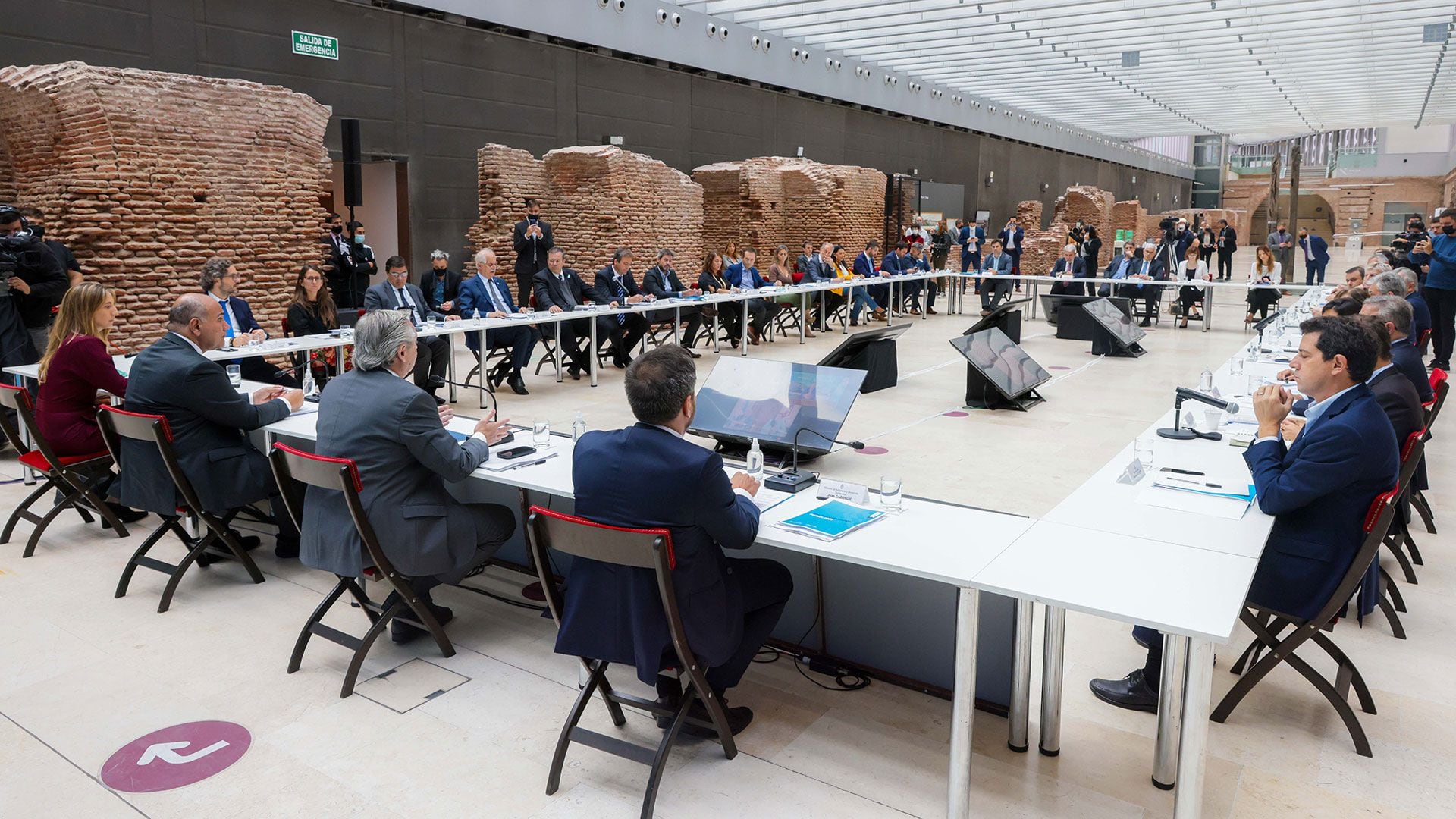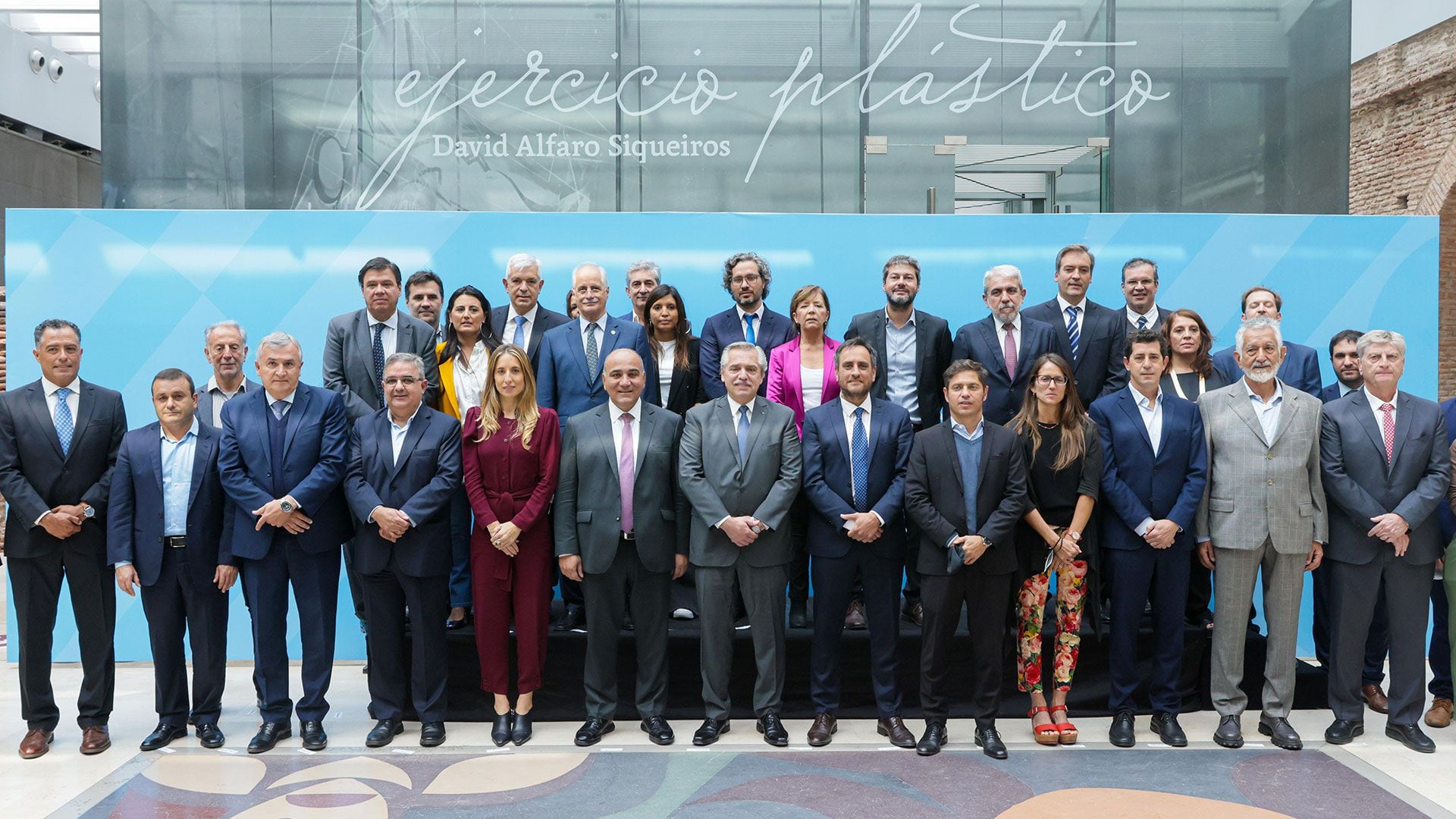
President Alberto Fernández, accompanied by the Chief of Staff, Juan Manzur; the Minister of Environment and Sustainable Development, Juan Cabandié, and the Secretary of Climate Change, Sustainable Development and Innovation, Cecilia Nicolini, led this noon at the Casa Rosada Bicentennial Museum the first meeting of the year of ministers and ministers of the National Cabinet for Climate Change, which also included the participation of several governors and deputy governors, including some enlisted in the opposition.
Fernández opened the meeting with a speech that lasted about 20 minutes. “It is a problem that has already arrived, that already hurts us and that therefore requires quick decisions,” he said about Climate Change. “There is a huge injustice” for which Argentina pays in impact “as if we were polluters, and in truth we are essentially a country that oxygenates the environment” and “emits less than 1% of the gases that produce the greenhouse effect,” continued the head of state.
“We have seen fires in the South as a result of heat and drought, and how recently 10 percent of the province of Corrientes and part of Misiones were affected by a fire generated by a triple combination: high temperatures, a drought as rarely seen, and the downspout of the Paraná and Uruguay rivers, which today have its lowest level of water in its history,” said the President.
Then he said, “Now, the big causes of the problem, who are also part of that rich central world, what are they doing to help us make the changes we need to make?” Argentina presented to different multilateral credit agencies, the G20, at the World Bank, and the IDB, among others and at the last Summit on Climate Change held in Glasgow, in early October 2021, a proposal to exchange its external debt for environmental actions, which did not receive a positive response.

The first such meeting (to be held every six months, in principle) began around 12:00 with this presentation by President Fernández and was followed in the speech by Chief of Staff Juan Manzur, Minister Cabandié and Secretary Nicolini, before hearing the concerns raised by several of the governors.
Fernández stated that “it is a fight that Latin American countries have to fight, which the vast majority of them provide a lot of oxygen to the world.” And that it is necessary to “demand that there be soft financing so that we can make the change” in the energy matrix “at the lowest possible cost”.
He also recalled that he became even more interested in climate change since he took office at Casa Rosada and that during his recent visit to Barbados, in one of his first actions as president of CELAC (Community of Latin American and Caribbean States), the story of that country's prime minister, Mia Mottley, ended in to convince him that it is imperative to undertake this work urgently.

“We already have the problem, we already suffer from it. And that's why we have to take action on the matter. Many governors are doing the right thing by seeking alternative energy, and we want to help them along that path,” said the Head of State, who also listed the importance of developing renewable industries.
After the meeting, Minister Cabandié, Secretary Nicolini and Gustavo Valdés, the governor of Corrientes, gave their impressions at Casa Rosada to accredited journalists. Cabandié stressed that “Argentina cannot stand still in the face of Climate Change”, that it is necessary “for all the provinces to agree on regulations and regulations” and that “a law on wetlands” is needed.
Nicolini, for his part, stressed the importance of this call “ministers and governors for a plan aimed at achieving carbon neutrality in the long term, in 2050″ and called for discussion in an expanded table “the issues we will bring to COP 27 November of this year”. The new Summit will take place in the city of Sharm el-Sheikh, Egypt, between 7 and 18 November.
Valdés described that Corrientes is in a better situation than in January and February when fires in the province affected nearly one million productive hectares. “Agricultural and livestock production were seriously affected and it will be difficult to recover. We are 1,000 millimeters down in the amount of rainfall and with a historic downspout of the Paraná River. We will surely have a lower production of yerba mate and rice,” said the provincial president.
The meeting was attended by the Ministers of the Interior Eduardo “Wado” De Pedro: of Foreign Affairs, Santiago Cafiero; of Defense, Jorge Taiana; of Justice, Martín Soria; of Security, Aníbal Fernández; of Labour, Claudio Moroni; of Women, Gender and Diversity, Elizabeth Gómez Alcorta; of Tourism and Sports, Matías Lammens; Julián Domínguez ( Agriculture, Livestock and Fisheries); Tristan Bauer (Culture) and Juan Zabaleta (Social Development).
There were also governors Axel Kiciloff (Buenos Aires); Gerardo Morales (Jujuy); Ricardo Quintela (La Rioja); Raúl Jalil (Catamarca); Gustavo Valdes (Corrientes); Alberto Rodríguez Saá (San Luis), Sergio Ziliotto (La Pampa) and Oscar Herrera Ahuad (Misiones), the deputy governor of Santa Cruz, Eugenio Quiroga and his partner from Tucumán, Eugenio Mansilla . And in virtual mode it was done by Rodolfo Suárez (Mendoza). Omar Perotti (Santa Fe), Gerardo Zamora (Santiago del Estero) and the deputy governor of Formosa, Eber Wilson Solis.
Also present at the Bicentennial Museum were the Secretary for Strategic Affairs, Gustavo Beliz; the Secretary of Energy, Darío Martínez, the Chief of Staff of the Ministry of Health, Sonia Tarragona, and the presidential spokeswoman, Gabriela Cerruti.
KEEP READING:
Últimas Noticias
Debanhi Escobar: they secured the motel where she was found lifeless in a cistern
Members of the Specialized Prosecutor's Office in Nuevo León secured the Nueva Castilla Motel as part of the investigations into the case

The oldest person in the world died at the age of 119
Kane Tanaka lived in Japan. She was born six months earlier than George Orwell, the same year that the Wright brothers first flew, and Marie Curie became the first woman to win a Nobel Prize

Macabre find in CDMX: they left a body bagged and tied in a taxi
The body was left in the back seats of the car. It was covered with black bags and tied with industrial tape
The eagles of America will face Manchester City in a duel of legends. Here are the details
The top Mexican football champion will play a match with Pep Guardiola's squad in the Lone Star Cup

Why is it good to bring dogs out to know the world when they are puppies
A so-called protection against the spread of diseases threatens the integral development of dogs




